Meet Bernhard, the entrepreneur with a micro-business empire
Two years ago, Bernhard was running a small photocopying and computer skills training business out of his rented house. Today he has a studio in a home he owns, employs two family members in his sweet potato farming business and part-owns a community billiards room that funds a profitable pig farm. And he’s not stopping there.
An uncertain future
Young people in Kenya face many problems. Quality education is rare and expensive. Disease, including HIV, is highly prevalent, and cultural stigma often prevents you from seeking help. And even if you graduate with your health intact, Kenya’s youth bulge means competition for entry-level jobs is fierce beyond imagination, and youth unemployment rates are some of the highest in the world.
Based in rural Embu County, Bernhard is one of the many young people who refuses to let adversity stop him. Ambitious, hardworking and full of entrepreneurial spirit, he established a small photocopying business in 2014 and taught basic computer skills on the side. He joined Hand in Hand a year later, seeing an opportunity to grow his business, and is now a part of a Self-Help Group made up of similarly eager young people.
Embu, Kenya
Building an empire
With their training complete, the group devised a plan that would generate money quickly. Pooling their savings, they bought a pool table and rented a room for it in the local shopping centre. It now provides a total profit of KES 10,000 (US $100) a month – and also keeps teenagers out of trouble. “When they are gathered there together, they concentrate on one thing. So it’s difficult for them to start thinking about crimes,” says Bernhard.
The impressive income generated by the community pool table has allowed Bernhard his group to invest in a bigger project: a farm with 10 pigs, which they believe will yield a long-lasting and sustainable income.
‘I decided to be unique’

Yellow sweet potatoes
Bernhard has also used his training to improve his own business, saving up the coins he earns from photocopying. Eager to invest, he researched which crops were most profitable and eventually bought a crop of yellow sweet potato vines, employing his mother and sister to help plant them.
Despite their popularity, sweet potatoes are not commonly grown in the area. “Here people don’t value sweet potatoes very much because they think it’s an indigenous plant, so they see it as a common thing. They think they are planted by old people, rather than farmers outside Embu County,” he says. “I decided to be unique.” Bernhard capitalised on a gap in the market, and is now reaping the rewards of his ingenuity.
“Before Hand in Hand – let me be frank – I was not very successful,” he continues. “After selling my sweet potatoes, I have managed to buy a picture printer that costs 24,000 KES (US $240), and I introduced a studio inside my room.”
Between his sweet potatoes and the income generated by his technology business, he has been able to build his own home and provide for himself and his new wife.
And his next big purchase? “A sofa set for the house.”
Bernhard’s results
Owns or part-owns 4 businesses
Employs 2 family members
Bought house
Value chains: all the buzz
Pauline Chemboi hated bees. They buzzed in your ear. They dined openly on your fruit. And the more you gave them a respectful distance, the more they refused to leave you alone. That was in 2013, back when she would sit up at night and worry about the next day’s meal. Today, she loves bees. And she’s never slept, or eaten, better.
“Owning beehives is traditionally a man’s job; we didn’t know we could it,” explains Pauline, beaming, as three of her Baringo County Self-Help Group colleagues tend to the hives behind her. “Many of us were afraid to start the venture, yet now here we are.”
Right around now is when most Hand in Hand Entrepreneur Stories would turn to our training or the generosity of our donors – and to be sure, both played a role. But this is a different kind of story, one that sheds light on the final, most opaque step in Hand in Hand’s job creation model: ‘linking members to larger markets’. Unique among third sector case studies, it starts not with indomitable women of X or the poverty-beating ambitions of Y, but with Ernesto Simeone, a gregarious Italian who saw an ad in the newspaper and decided he could make an easy buck.
Creating jobs in four (not so) simple steps
Hand in Hand’s four-step model is straightforward enough. First, we mobilise Self-Help Groups who support each other, save together and learn together. Second, we teach them the basics of business: bookkeeping, marketing and, if they lack bankable skills, the ins and outs of high-margin vocations such as honey production. Third, we provide microcredit to help them get up and running. And fourth – well, here’s where things can get a bit tricky.
At its core, ‘linking members to larger markets’ means helping them reach more customers. Sometimes that’s as simple as helping improve their branding and packaging. Other times, it means getting their products into actual, physical markets in nearby towns. Increasingly, however, we’re dreaming bigger and plugging our members into regional, national and even international value chains. It’s a strategy borne of a simple need: to make sure members’ businesses long outlast our support.
Which brings us to Ernesto.
The Italian job provider
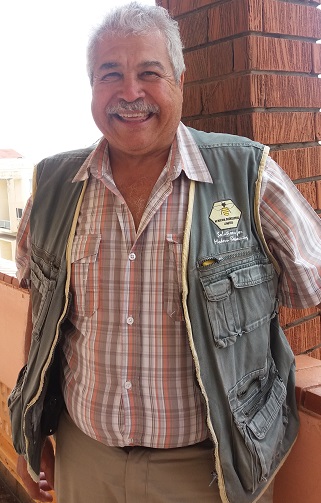
Ernesto Simeone
Ernesto Simeone is a fitting poster-child for international value chains. Italian by heritage, he was born in Kenya, the son of an Italian POW who’d been “frogmarched from Ethiopia by the Brits”. His career in honey stretches back to 1994, when a Japanese company placed an advert in a Nairobi newspaper. “They were looking to buy honey from East Africa. I thought, that’ll be easy: buy some honey from the small-scale guys and sell it,” he says. “It didn’t work out that way.”
For one, the local ‘industry’, if you could call it that, needed modernising. “For me, the honey industry in east Africa is not beekeeping; it’s honey hunting. The quality being produced by these small-scale farmers is not very good. In fact, you can’t trade with it on the international market,” says Ernesto, whose company, an SME called African Beekeepers Limited (ABL), employs about 10 Kenyan staff. Local producers were sceptical of his outsider’s methods. And even if they hadn’t been, Ernesto lacked the infrastructure to train them at significant scale.
If only I could partner with an NGO that had proven experience training grassroots entrepreneurs, he thought.
Great minds
Two-hundred miles south in Nairobi, Hand in Hand Eastern Africa staff were poring through data on value chains. “If only Hand in Hand could partner with a honey producer capable of providing a market for our members,” someone said.
With so few players in Kenya’s honey industry, it wasn’t long before Hand in Hand rang ABL. Days later, they were in a room with Ernesto devising a sustainable, profit-based model that would benefit him, Hand in Hand and, most importantly, our members.
Here’s how it works.
Hand in Hand teaches Self-Help Groups the skills they need to run successful beekeeping enterprises, technical and otherwise. It also provides them with the means: microloans to pay for inputs such as beehives and suits. Ernesto’s company, ABL, sells them those inputs. It also provides them with an ongoing, reliable market – purchasing, packaging and selling their honey under its Bizzy Bee brand.
“Last week, our harvest was 188 kilos,” says Ernesto. “I paid Hand in Hand’s members 70,000 KES (US $700) direct through mobile banking. It’ll retail for about double that at supermarkets.”
As their profits grow, members repay Hand in Hand’s loans – which, in turn, get cycled back to new members. And for as long as people eat honey – whether in Japan or at home in Kenya – producers like Pascaline have work.
“This project has helped us a lot,” she says. “We can pay school fees and food for our homes. Every woman can now support her family.”
Results
1,400 entrepreneurs in honey value chains countrywide
Average yield per co-operative: 70,000 KES (US $700)
Women’s participation rate: 80%
Meet greenhouse farmer Alice Maina
At an age where most people would think of retiring, Alice Maina has started a flourishing small agri-business which will set her and her husband up safely for old age. Thanks to Hand in Hand’s support she now earns KES 20,000 (US $231) a month selling tomatoes and ‘piri piri’ chilli peppers, grown in a greenhouse which she built on her land.
Making ends meet
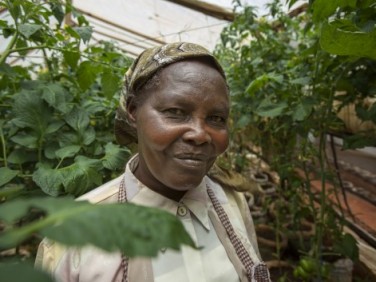 Alice lives in a hamlet near Gatundu, in Kiambu county, which despite being only 16 kilometres north of Nairobi is a lush rural area dominated by large commercial farms growing coffee, tea and pineapples. Automation means these farms do not offer much local employment. Instead, most people here are subsistence farmers who just about manage to live off small family-owned plots, which are shrinking in size as the population continues to grow. Alice was a public school teacher – a poorly paid profession in Kenya – when arthritis forced her to retire early. She and her husband were growing vegetables for their own consumption.
Alice lives in a hamlet near Gatundu, in Kiambu county, which despite being only 16 kilometres north of Nairobi is a lush rural area dominated by large commercial farms growing coffee, tea and pineapples. Automation means these farms do not offer much local employment. Instead, most people here are subsistence farmers who just about manage to live off small family-owned plots, which are shrinking in size as the population continues to grow. Alice was a public school teacher – a poorly paid profession in Kenya – when arthritis forced her to retire early. She and her husband were growing vegetables for their own consumption.
Gatundu, Kenya
A bold investment
When Hand in Hand started training her local members’ group, Alice recognized that in order to survive she needed to make her only asset work harder. Alice borrowed money from her local group’s savings fund to buy piri piri chilli seeds, knowing the small peppers fetch a good price on the local market. Her first crop of chillies produced an income of KES 48,000 (US $550) in two months. “I made a good profit because I cut out the middle man and went to the market myself to sell the chillies,” says Alice.
Alice then used KES 15,000 (US $170) of the proceeds and a loan of KES 100,000 (US $1,000) from Kenya’s leading microfinance institution, to whom her Hand in Hand trainer introduced her, to build a small greenhouse.
Thriving on tomatoes
Thanks to the greenhouse, she managed to grow a sizeable crop of beautiful tomatoes. The former teacher has a keen understanding of competition and attributes her commercial success to three things: “Better quality – my greenhouse tomatoes taste better than the normal ones. Good presentation – I always wash them and put them in nice boxes. And last, I’m a good saleswoman – I make sure to talk to all my customers. That’s why I sell more than others.”
“I cut out the middle man and went to the market myself”
Alice feels that the Hand in Hand business training has protected her economic future. “Ten shillings used to buy me flour, sugar, tomatoes and even milk, but now it hardly buys me anything. Life has changed and so I need to change.”
Not content to stand still, she is looking forward to a bigger second crop of tomatoes now. Her Hand in Hand trainer introduced her to a farming expert from the Kenyan Ministry of Agriculture to show her better horticulture techniques.
Sharing success
She is also employing Patrick Kahuni (pictured right), one of her neighbours, to water, fertilise and weed the plants while she goes to the market. Patrick,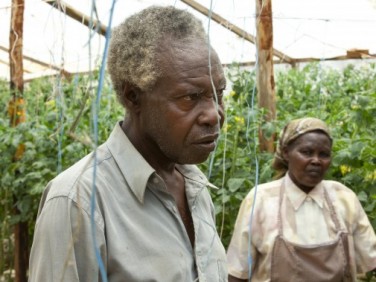 a father of ten, also farms his own ancestral land but, like Alice, could not make it pay. As a result, Patrick could not afford Kenya’s secondary school fees and four of his chyildren had to drop out of school. Working for Alice has meant that Patrick has managed to put one of his children through secondary education.
a father of ten, also farms his own ancestral land but, like Alice, could not make it pay. As a result, Patrick could not afford Kenya’s secondary school fees and four of his chyildren had to drop out of school. Working for Alice has meant that Patrick has managed to put one of his children through secondary education.
Alice herself is funding her granddaughter’s secondary schooling and is saving up for her own old age.
“I am over 60 now so, God willing, one day I will not have to work anymore. I want to save today, for tomorrow. I want to work hard then retire.”
Alice’s results
Monthly income of KES 20,000 (US $231)
Funds granddaughter’s schooling
Employs neighbour with a family of 10
Benedetta, the basket weaver of Tala
Prior to getting involved with Hand in Hand, Benedetta Kalondu, a mother of two in her forties, was one of many women in her area just surviving on casual jobs. Today, Benedetta runs a small basket weaving business based on recycling, which produces an income of KES 7,000 (US $80) per month, employs two neighbours and has earned the respect of her community.
Starting out
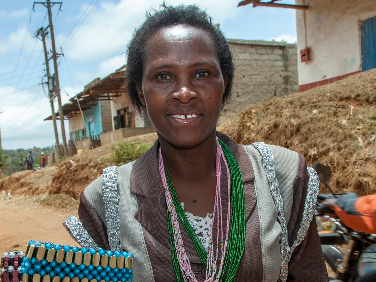 Benedetta lives in a hamlet near Tala, a town of around 200,000 56 kilometres east of Nairobi. Dry terraced fields cover every hill and subsistence farming sustains the families living here. However, the arid conditions mean that crops fail and famine regularly strikes the local community.
Benedetta lives in a hamlet near Tala, a town of around 200,000 56 kilometres east of Nairobi. Dry terraced fields cover every hill and subsistence farming sustains the families living here. However, the arid conditions mean that crops fail and famine regularly strikes the local community.
Looking back, Benedetta reflects that the first step on her journey to becoming a businesswoman was also the hardest. There were no immediate apparent benefits and no handouts available at the start of the Hand in Hand training. Instead, Benedetta and her friends were asked to start to plan their daily cash-flow and to save, moving away from a lifetime’s habit of living ‘hand-to-mouth’.
“My eldest son will finally complete school this year”
Finding a business niche
The business module of the training made Benedetta realise that what she had always thought of as an enjoyable hobby – making baskets – could in fact be turned into a money-making activity. As many types of baskets were already readily available in the local market, her Hand in Hand trainer, Mary Katoni, encouraged Benedetta to think of a way to differentiate her products.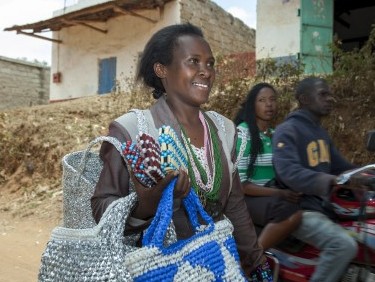
Benedetta spotted an opportunity to recycle discarded silver foil paper into bright, shiny silver baskets. After showing her group a few prototypes, they encouraged her to follow up on the idea. Benedetta took out a loan of KES 10,000 (US $112) from the group fund to buy and transport raw materials.
Two of her fellow group members have since been trained by Benedetta in the technique, allowing her to expand her production. Marketing is the biggest priority for Benedetta as she lives in a remote hamlet, so she regularly walks with all her stock to the nearby Tala town market.
Tala, Kenya
A path out of poverty
What Benedetta appreciates most in the Hand in Hand approach is the support of her group, which she feels has alternatively challenged and encouraged her in her business ideas. She also learned from other members to grow vegetables on her ‘shamba’ (ancestral piece of land) to reduce her living costs. “I thought, if Alice can do this, I can also.” The group has set aside a welfare fund to pay for hospital bills when members become ill. To reward those members who invest in education, the group also contributes KES 1,500 (US $17) for all members’ children’s final exam fees once a year.
With Benedetta’s additional income, her family can now easily cover their daily needs and school fees are no longer a struggle. Benedetta’s eldest son – who had missed an entire school year as his parents were unable to pay for his fees – will finally complete school this year.
Benedetta’s results
![]()
Monthly income of KES 7,000 (US $80)
![]()
Access to bigger markets
![]()
Eldest son finishing school
Chris, training slum dwellers in business
Local hero
Like many of his colleagues at Hand in Hand, Chris studied co-operative management. Two years into his job and responsible for coaching around 400 Hand in Hand group members, he clearly enjoys it: “Working with the community is the best thing I have ever done.”
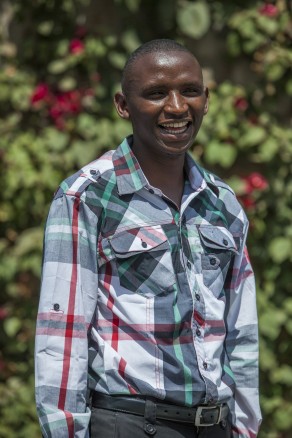 A former Scout leader, he has always volunteered in community projects and was keen to continue with social work. “I meet different people – some are rude, some are good, some are kind. I feel that now I can speak to anyone and make a difference.” The most challenging part of his work? “I am out in every weather, visiting up to four groups a day and following up with individuals, in the heat, the cold or the rain.”
A former Scout leader, he has always volunteered in community projects and was keen to continue with social work. “I meet different people – some are rude, some are good, some are kind. I feel that now I can speak to anyone and make a difference.” The most challenging part of his work? “I am out in every weather, visiting up to four groups a day and following up with individuals, in the heat, the cold or the rain.”
Some people are harder to train in financial literacy and business skills than others. “I have some clients who may not even have been to primary school. At first they only know about waking up, looking for food for the day, and that’s their life, so it can be difficult to get through to them.”
But in most cases, he feels he is making a tangible difference. “I was able to teach the groups about financial discipline. They may know how to use numbers, but not how to figure out how much they can afford. They are so used to just thinking about making enough to eat that day. Now they understand the point of having at least a small reserve for an emergency,” says Chris.
‘A good teacher’
Irene Wanjiku, one of Chris’s trainees, says about him: “I had a business before but it was Chris who advised us to move away from our old shop because the rent was just too high. And he was right, in the new shop we will pay so much less rent. He is a good teacher. ” Thanks to Chris’s intervention, Irene’s monthly income will increase from 5,500 to 9,000 Kenyan Shillings (around US $105) a month.
“Working with the community is the best thing I have ever done”
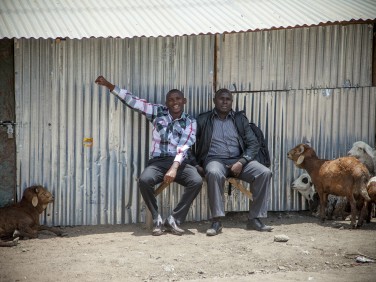
Chris has found working with Irene and her group really inspiring: “The moment I met them, I admired how they survive. They taught me that by being a hard worker you can do anything. They don’t have an education, they don’t have a job, yet they are very creative, they have ideas for a business, they believe they can make it. It’s all about determination – they know what they want. People around them might do drugs, or give up.
“The moment I feel like giving up, I think of them. If they are making it, then who am I to give up? It really motivates me.”
Sisters of Faith, social entrepreneurs
Water scarcity
Four in 10 Kenyans do not have access to safe, clean water. Erratic weather patterns cause regular droughts and there is a limited renewable water supply. As a direct result, sanitation- and hygiene-related illnesses are the number one cause of hospitalisation in children under age five in the country.
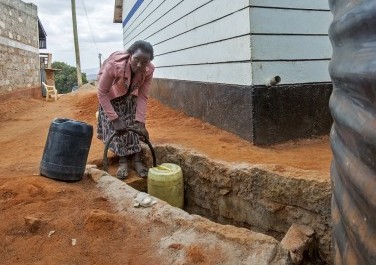
The Sisters of Faith experience the effects of water scarcity more than most: they live in Machakos county, 65 km southeast of Nairobi and one of the driest areas of Kenya. Deforestation has led to gradual erosion of the hilly terrain here. Most people live on family farming in terraces (to reduce erosion and capture water), but due to the lack of water the county has still experienced famines on a regular basis in the last few years. There is no piped water in the Sisters’ neighbourhood.
Prior to their training by Hand in Hand, the Sisters typically survived on casual jobs, relying mostly or entirely on their husband’s incomes to support the family. The group’s chairwoman recalls the start of the group in 2011: “When we first heard about Hand in Hand, we liked what we heard because they did not just talk about money. Like so many other groups, they also talked about knowledge and skills – and that is what we needed.“
Machakos, Kenya
Sisters of co-operation
They rapidly raised a group saving fund worth KES 50,000 (US$ 690). Together with the business training, loans from the saving fund allowed almost every group member to establish a small business within a year, ranging from crocheting floor mats to retailing vegetables or raising poultry. One of them, Virginia Nzioka says, “I used to be a housewife who had to go to others’ homestead to ask them to give me a job. Now I am someone in society, we don’t struggle to pay my daughter’s college fees and we can still afford salt and sugar.”
The group started selling water on tap, serving their community with affordable, safe water and making a profit
An ambitious venture
More than half of the group have opened their own bank accounts with encouragement from Hand in Hand and this has made it much easier to manage their family finances. Typically, only 38 percent of people living in rural Kenya have access to a bank account.
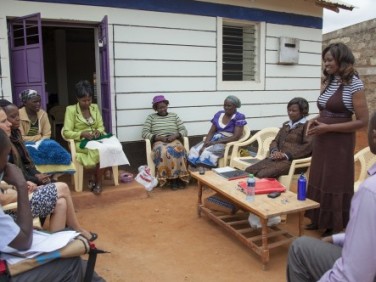
One year on, their Hand in Hand trainer, Robert Ithibua, suggested that the group should explore a more ambitious venture serving an underserved market. The Sisters identified water as one of the scarcest goods in their immediate area. Safe water was only available from a few isolated water distribution points and a handful of traders selling water at extremely high prices from donkey carts.
The group agreed a contract with the municipality to deliver water weekly by truck, sourced water purification chemicals and raised a microloan to buy and install a big tank on land donated by their church. In June 2013 the group started selling water on tap, serving their community with affordable, safe water and making a profit before interest of KES 12,000 (US$ 138) a week.
The Sisters are planning to set up a second tank once they have paid off their first loan. And other women in their church can’t wait to start Hand in Hand training. “We are giving Robert [their trainer] more work!” said Virginia.
Sisters of Faith’s results
![]()
Group savings fund worth KES 50,000 (US $690)
![]()
Weekly profit before interest KES 12,000 (US $138)
![]()
First loan paid; planning to expand
Meet Martha, the 68-year-old eco-entrepreneur
A semi-literate 68-year-old farmer living in a rural hamlet in Kenya, Martha Kimuyu is not your typical pioneering eco-entrepreneur. And yet she has launched a profitable ‘green fuel’ business which has multiplied her income by a factor of five.
A family of community leaders
When we meet Martha, it is immediately apparent that she is an influential member of her community. Leading community groups runs in her family: Martha’s mother was the chairwoman of a basket weaving group herself.
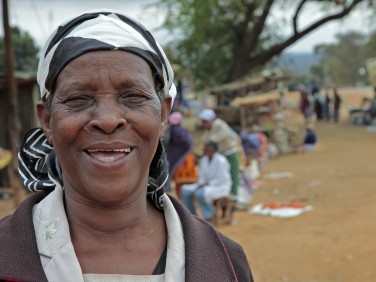 When Martha turned 18, she decided to set up and chair her own group: “The people around me were just sitting around all day long, doing nothing productive, so I told them to come together to plant maize and onions”.
When Martha turned 18, she decided to set up and chair her own group: “The people around me were just sitting around all day long, doing nothing productive, so I told them to come together to plant maize and onions”.
Almost 50 years on and she is still the treasurer of the group, although as some of the members have died, their daughters have taken their place. Martha’s own daughter is also following in her footsteps and leads a self-help group in another village.
When Martha was widowed some years ago, she decided to take up a business to help to support herself. Coca Cola were offering loans to set up drinks kiosks and Martha seized the opportunity in the roadside market near her home. Although she managed to gradually pay off the credit, and diversify the range of drinks she sold , the income from the kiosk stagnated for many years at around 2,700 Kenyan shillings (KES) a month – around US $30, barely enough to survive on, let alone support the two orphaned grandchildren who came to live with her.
Seeing green
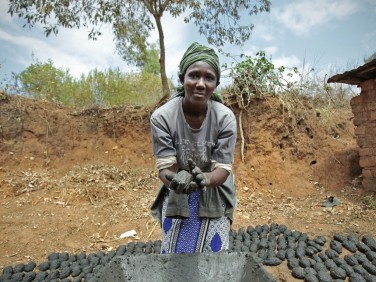 When Hand in Hand came to the area in 2011, Martha signed up her group for Hand in Hand business training. A session on green, sustainable business opportunities triggered a bold idea in Martha’s mind: on a visit to her daughter, living in the Nairobi slum of Kawangware, she saw her daughter cooking with charcoal dust briquettes.
When Hand in Hand came to the area in 2011, Martha signed up her group for Hand in Hand business training. A session on green, sustainable business opportunities triggered a bold idea in Martha’s mind: on a visit to her daughter, living in the Nairobi slum of Kawangware, she saw her daughter cooking with charcoal dust briquettes.
Charcoal briquettes are made by mixing charcoal dust – which remains after the charcoal has been burnt – with water and soil as binding agents. The briquettes, invented ten years ago by some of Nairobi’s lowest income residents, are regarded as an exciting development by renewable energy experts. They typically reduce cooking-fuel costs by 90 percent, save trees and dramatically reduce the air pollution caused by cooking with charcoal.
At 68, Martha is not your typical eco-entrepreneur. And yet she has launched a ‘green fuel’ business which has multiplied her income by a factor of five
Martha decided to become the first briquette provider in the area. She convinced a few neighbours to collect and sell her their charcoal dust instead of throwing it out. To launch the briquettes into the market, Martha initially gave samples to her neighbours to try. Hand in Hand’s financial literacy training kicked in when she needed to set the price of this new product in her area: with the cost of raw materials at KES 80, she decided to set the price of the resulting briquette production at KES 150 to ensure she would make a profit.
Martha now earns 14,000 KES (US $163) a month. The increased income has made it much easier for Martha to feed herself and her grandchildren a more varied diet – buying additional produce in the market rather than having to rely solely on the produce of her “shamba” (own land).
An eco-pioneer
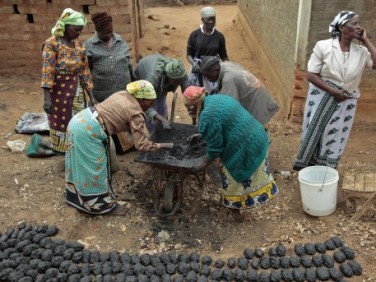 Like many areas in Kenya, Machakos, the county where Martha lives, has experienced deforestation as trees are cut down to make coal. The hilly terrain is gradually eroding, aggravating the aridity of the climate and making it more difficult for families to subsist on family farming. The county has experienced famines in the last few years.
Like many areas in Kenya, Machakos, the county where Martha lives, has experienced deforestation as trees are cut down to make coal. The hilly terrain is gradually eroding, aggravating the aridity of the climate and making it more difficult for families to subsist on family farming. The county has experienced famines in the last few years.
So it is no surprise that the members in Martha’s group have lined up to learn how to make the charcoal briquettes, which generate an income and help to save trees. True to Martha’s spirit of being a community leader, she has also taken up Hand in Hand’s invitation for her to train groups further afield in the county.
Machakos, Kenya
Martha’s results
Monthly income 14,000 KES (US $163)
Became Hand in Hand trainer
Able to provide family a more varied diet
Meet Halima, print shop owner
At 18 years old, and with a seven-month-old son, Halima is already managing to make a better living than many of her neighbours in the Nairobi slum of Kawangware.
Together with her friend Irene, she owns and runs a film rental and print shop.
A tough start
Life in Kawangware is hard. Here, in just three square kilometres, some 800,000 people, work, live and play. Water on tap is not available every day and safe drinking water is expensive. Disease is rife, especially HIV and malaria.
Kawangware, Nairobi, Kenya
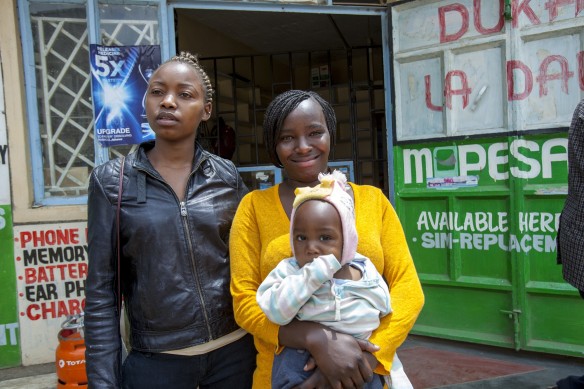 Orphaned at 14, Irene had to fend for herself from an early age. When she turned 19, Irene managed to secure a job in a local film rental shop. The owner gradually left her entirely in charge and Irene offered to buy the equipment from him, spreading the payments over several monthly instalments.
Orphaned at 14, Irene had to fend for herself from an early age. When she turned 19, Irene managed to secure a job in a local film rental shop. The owner gradually left her entirely in charge and Irene offered to buy the equipment from him, spreading the payments over several monthly instalments.
Finding herself in charge of her own business without really knowing much about bookkeeping or cash flow, Irene eagerly took up the offer of business training when Hand in Hand set up a group for young women in Kawangware. She also persuaded her younger friend Halima to join.
“In the group we learn that we have to help each other, so that is why I involved Halima in the business: she was just sitting at home, not making any money”
Following the training, Halima and Irene realised they could increase the shop’s profits by expanding the range of services. They borrowed money from their group’s savings fund and bought a popcorn machine to complement the film rental and a printer/photocopier to offer business services.
Increased profits
As a result profits increased and Halima and Irene were able to pay themselves KES 10,000 (US$ 120) per month. However, they soon realised that the high monthly rental costs of KES 9,000 per month almost wiped out their profits. Despite the steady flow of customers they often had to borrow from their Hand in Hand group’s savings fund in order to pay the rent.
Building a new shop
Undeterred, the two friends and Halima’s sister (Farida) pooled their savings of KES 20,000 to build a new shop – which would also contain a beauty salon run by Farida.
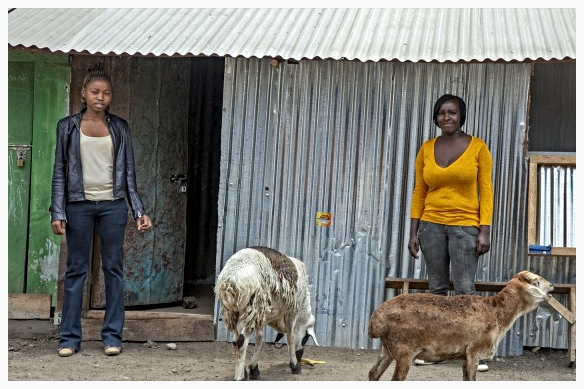
Halima and Irene | DVD rental shop owners | Nairaobi, Kenya
Built on family land, the new shop’s monthly rent would be just KES 2,000. Irene, who has clearly absorbed the lessons of the Hand in Hand business training, explained their plan. On the day we met them, Irene and Halima were just about to open up the new shop – a gleaming corrugated iron hut of around 8 square metres (pictured right). The women’s joint monthly profit will now increase to around KES 17,000 (US$ 200) and Halima can provide a safer future for herself and her son.
Halima’s results
Joining a Hand in Hand Self-Help Group changed Halima’s fortunes, both in business and in life.
Monthly rent decrease from KES 9,000 (US $101) to KES 2,000 (US $22)
Joint monthly profit of KES 17,000 (US $190)
Able to provide a safer future for her and her son
